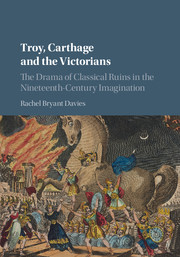 Troy, Carthage and the Victorians
Troy, Carthage and the Victorians Book contents
- Frontmatter
- Contents
- List of Plates
- List of Figures
- Acknowledgements
- Prologue
- 1 Introduction: The Ruins of Troy and Carthage ‘Still Flaming to the Imagination’ in the Nineteenth Century
- 2 ‘An Imaginary Troy’: Homeric Pilgrimage, Topography and Archaeology
- 3 ‘Not Classic, but Quite Correct’: The Trojan War at the Circus
- 4 Freely Perverted from Classic Texts’: The Iliad and Aeneid Burlesqued
- 5 ‘Sitting Among the Bricks of Covent Garden’: Carthage and the Future Ruins of the Nineteenth Century
- Epilogue: Troy and Carthage as ‘A Beacon and a Warning’
- Appendix A List of Burlesques
- Appendix B Select Chronology
- References
- Index
5 - ‘Sitting Among the Bricks of Covent Garden’: Carthage and the Future Ruins of the Nineteenth Century
Published online by Cambridge University Press: 03 March 2018
- Frontmatter
- Contents
- List of Plates
- List of Figures
- Acknowledgements
- Prologue
- 1 Introduction: The Ruins of Troy and Carthage ‘Still Flaming to the Imagination’ in the Nineteenth Century
- 2 ‘An Imaginary Troy’: Homeric Pilgrimage, Topography and Archaeology
- 3 ‘Not Classic, but Quite Correct’: The Trojan War at the Circus
- 4 Freely Perverted from Classic Texts’: The Iliad and Aeneid Burlesqued
- 5 ‘Sitting Among the Bricks of Covent Garden’: Carthage and the Future Ruins of the Nineteenth Century
- Epilogue: Troy and Carthage as ‘A Beacon and a Warning’
- Appendix A List of Burlesques
- Appendix B Select Chronology
- References
- Index
Summary
Marius sat thinking … I suppose he was reflecting how grand cities may fall, as Carthage did, and how powerful statesmenmay also fall from their high estate, as he himself had done.
F. J. Gould, The Children's Plutarch: Tales of the Romans (1910) 75.[T]he days of England's glory have their number, and the period of her decline will at length arrive.
John Chetwode Eustace, Classical Tour (1813) I, 23–4.On 6 March 1856, Londoners woke to the news that ‘the Royal Italian Opera House, Covent-garden, was totally destroyed by fire’. Twenty-five fire engines had prevented this conflagration from spreading; however, unlike in Dibdin's Troy, there was no reprieve from the flames. The Illustrated London News immediately devoted several pages to the fire-fighters in action and the Queen's tour of the strikingly ancient-looking ruins (Figure 5.17). Yet this traumatic event, like the controversy over the Society of Antiquaries's request for funding to excavate Troy, would remain potent in the public imagination: further images of the fire circulated and, just over a year later, ‘a serio-comic opening address’ written by Robert Brough – who would soon write the Lyceum's Siege of Troy – was the ‘gem of the evening’ at opening night festivities nearby. Brough turned the Italian Opera's destruction to comic account in comparing the manager as a young actor to:
A stray oyster in an empty barge.
Or Marius – Mario – I beg your pardon,
Sitting among the bricks of Covent Garden.
At first sight, this burlesque joke, like those we saw in the previous chapter, simply exploits outrageous anachronisms to conflate past and present. It is no surprise that Brough's allusion – to the consul Caius Marius in exile among the ruins of Carthage – and his humorously pedantic linguistic correction distinguishes between spectators who did, or did not, know their Classics.
This chapter will explain why Brough's choice of this specific comparison to Carthage is neither random nor superficial.
- Type
- Chapter
- Information
- Troy, Carthage and the VictoriansThe Drama of Classical Ruins in the Nineteenth-Century Imagination, pp. 271 - 338Publisher: Cambridge University PressPrint publication year: 2018
